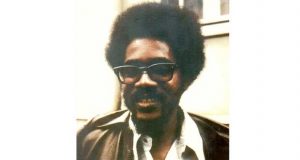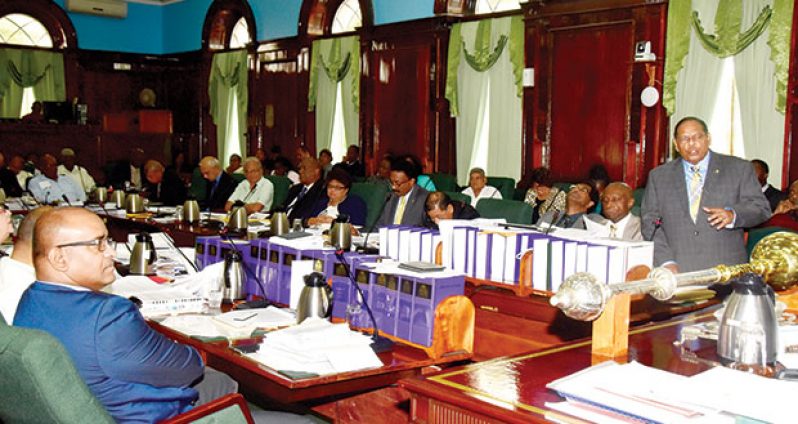By Ravin Singh
“TODAY our nation is more divided than it was in the 1980s,” cried Opposition Chief Whip, Gail Teixeira as her motion on the death of renowned historian and political activist, Dr Walter Rodney, failed to gain the support of the government in the National Assembly early Friday morning.
After six hours of rigorous debate and robust arguments, it was the eastern side of the House that emerged with the upper hand, eventually amending the Walter Rodney Commission of Inquiry (CoI) motion and passing it in the House just before dawn.
The CoI, which cost the state GYD$400M, was chaired by Barbadian jurist Sir Richard Cheltenham. It was set up by the former People’s Progressive Party (PPP) government in February 2014, to inquire into what led to and who was responsible for the bomb blast that killed Dr Rodney on June 13, 1980. Dr Rodney was also leader of the Working People’s Alliance (WPA).
Sponsored by Teixeira, the motion sought to have the National Assembly adopt the report and its findings, and have the government commit to taking measures to implement its recommendations in an attempt to preserve and strengthen the democratic architecture of the state.
The Rodney Report recommended, among other things; the need for a highly professional Police Force and Military Force; for crimes such as murder be investigated with “thoroughness and urgency”; and for there to be a review of the systems in place to store records of the Guyana Police Force and the Guyana Defence Force. Other recommendations were based on the need for ethnic harmony and for the Chairman of the Guyana Elections Commission (GECOM) to be an individual of integrity.
At the end of the debate however, the coalition government – of which the People’s National Congress (PNC) is a member – amended the motion which now calls for an examination of the findings of the report to ascertain which are acceptable and implementable.
The word “adopts” was also replaced with “acknowledges” and this reversed the call for the National Assembly to adopt the findings of the report.
CONTENTIOUS
The findings of the report though, had been a contentious issue.
Many on the government’s side believed that no definitive pronouncement could be made on who had killed Dr Rodney, despite the report stating that the State, controlled by the then PNC, had a part to play in the historian’s death.
Prime Minister Moses Nagamootoo, who was with the PPP during the 1980s, spoke passionately about the WPA leader, with whom he shared political experiences. Now with the coalition government, the PM said he believes that while the scholar’s death was unfortunate, solid enough evidence has not been produced to convince him that former President Forbes Burnham or the PNC had killed Dr Rodney.
“I don’t have the answer whether Forbes Burnham or the PNC (People’s National Congress) or rogue elements in the army or the police force or imperialists or the House of Israel, that rogue elements, that this man Gregory Smith was an agent of any if these persons or entities; I cannot, because I don’t have the evidence,” he said, amidst deafening silence in the House.

Agreeing with the PM was Minister of Natural Resources, Raphael Trotman, who contended that the report falls short of minimum standards and expectations of the general public.
Refusing to accept the findings on the basis of it being “hear say,” Trotman said that, “What is before us is a report and reports of this kind are subject to review. Reviews of CoI are permissible, they’re not immutable. They can be dissected. It is not the final decision on an issue.”
A SECOND ASSASSINATION
But PPP parliamentarian, Clement Rohee, held strong views against government’s refusal to accept the findings of the report. In fact, Rohee went on to describe the debate of this motion as “another assassination of Rodney.”
“What we witnessed tonight is an assassination of the truth. The truth about the circumstances surrounding Dr Rodney’s death has been murdered. The findings are obviously damaging to the current administration. By logical extension they have to reject it. That is the only logical conclusion one can draw,” Rohee said.
Fellow PPP Member of Parliament (MP) Anil Nandlall also stood in defence of Teixeira’s motion, arguing that today, in Rodney’s own home – Guyana – where he fought for national unity and against oppression of the working people, his legacy is being denigrated. He said that if the coalition government believed that enough persons had not been interviewed by the commission, as was advanced by Minister of State Joseph Harmon, then President David Granger should not have ended it prematurely and should have allowed those persons to be interviewed.
After 66 days, 29 witnesses, and a four-month recess due to General and Regional elections in Guyana, the CoI was brought to an end in July 2015, despite Dr Rodney’s family calling for a two week extension.
Meanwhile, in the House, Minister Harmon, an Executive Member of the PNC, expressed his view that the CoI was a “well-planned ploy by the PPP” in the run-up to the 2015 elections. Harmon said that it was an attempt by the then PPP government to “deceive the citizenry,” but that it backfired as they were ousted from executive office.
NO POLITICAL MILEAGE
Teixeira in her final speech though, refuted these claims – a view which was also expressed by Minister Trotman. The Opposition Chief Whip reasoned that it could not have been used to gain political mileage as was suggested by government MPs, since news of a 2015 elections came subsequent to the establishment of the CoI.
The commission was set up on February 8, 2014. However, the no-confidence motion by the then combined opposition which triggered the 2015 elections was not presented in the House until the end of 2014.
She also echoed sentiments similar to Rohee’s that, “There appears to be no desire to know the truth. We in this house are repeating the assassination of Dr Rodney.”
The government then used its one seat majority in the House to amend the motion and have that amendment passed.
Outside of the National Assembly, President David Granger who is the current leader of the PNC had also rejected the findings of the report which he described as “flawed”.
Dr Rodney was born into a working-class family in Guyana on March 23, 1942. He attended Queen’s College in what was then British Guiana, and became a champion debater and athlete. He subsequently attended the University College of the West Indies (UCWI) in Jamaica, on a scholarship, graduating in 1963 with a first-class degree in History, thereby winning the Faculty of Arts prize.
Dr Rodney earned a PhD in African History in 1966 at the School of Oriental and African Studies in London, England, at the age of 24. Many described him as having shifted the socio-political culture in Guyana, which was highly polarized, through activism.
The scholar was killed when a communication device exploded in his brother’s car on June 13, 1980. The then government of Prime Minister Burnham claimed that Dr Rodney was engaged in an attempt to bomb a prison near where the incident took place, in Georgetown.




.png)









